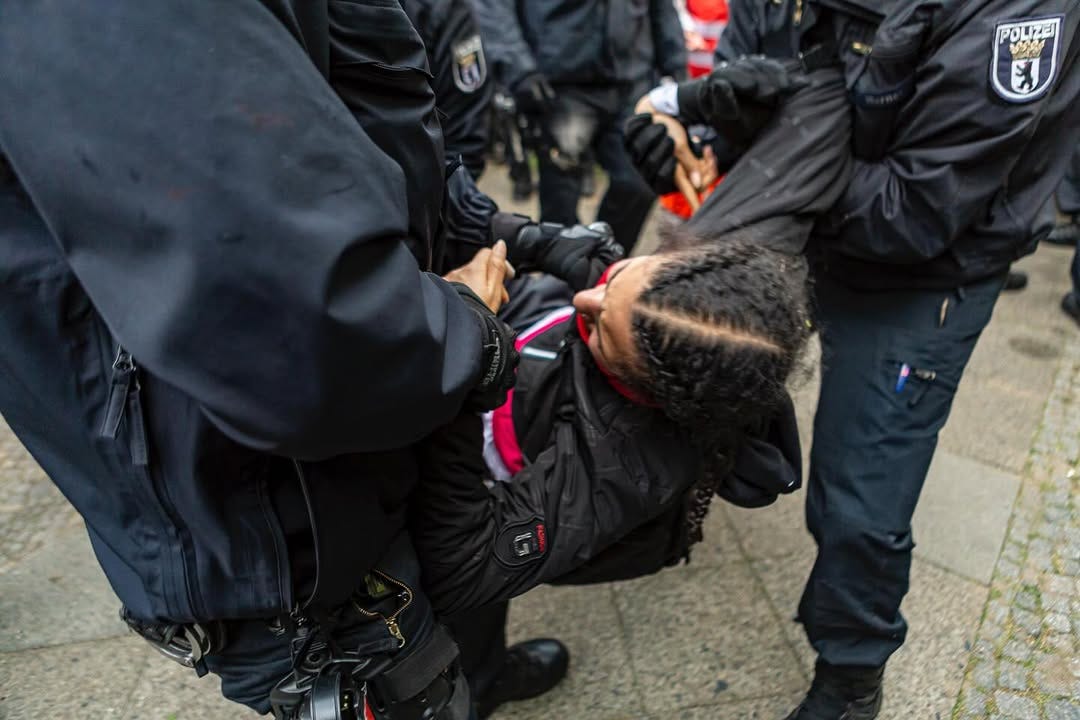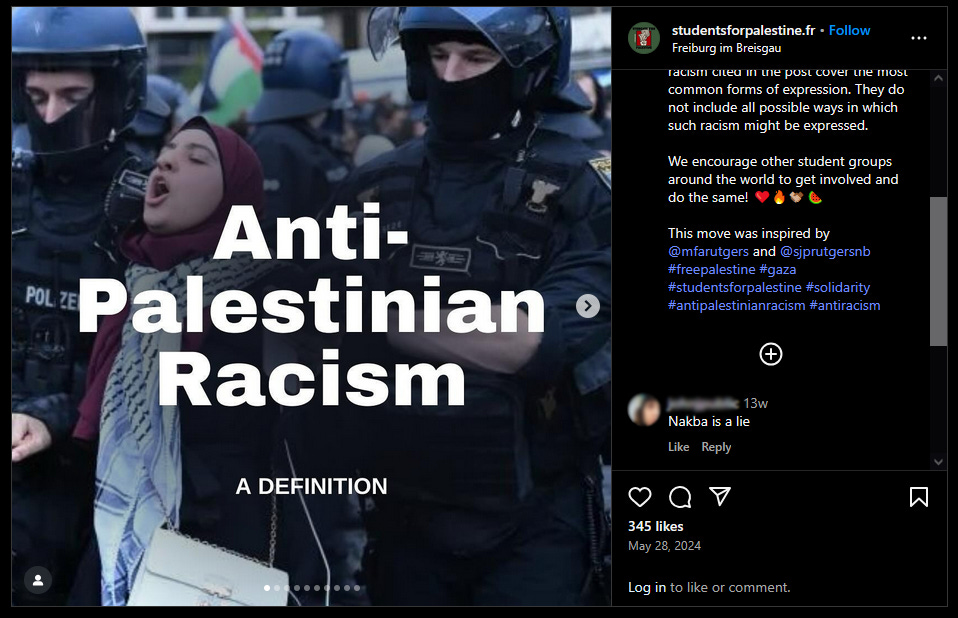In view of the alarming increase in cases of anti-Palestinian racism in Germany and within our university community, and recognizing the need to combat all forms of racism and discrimination and to actively protect those affected, we, the Students for Palestine Freiburg, felt the need to define the many ways in which anti-Palestinian racism can manifest itself.
The manifestations of anti-Palestinian racism cited in the post cover the most common forms of expression. They do not include all possible ways in which such racism might be expressed.

A Definition of Anti-Palestinian Racism
Anti-Palestinian racism is a form of anti-Arab racism that silences, excludes, erases, stereotypes, defames or dehumanizes Palestinians or their narratives. It includes denying the Nakba and justifying violence against Palestinians; failing to acknowledge Palestinians as an Indigenous people with a collective identity, belonging, and rights in relation to occupied and historic Palestine; erasing the human rights and equal dignity and worth of Palestinians; excluding or pressuring others to exclude Palestinian perspectives, Palestinians and their allies; defaming Palestinians and their allies with slander such as being inherently antisemitic, a terrorist threat/sympathizer, or opposed to democratic values.

Manifestations of Anti-Palestinian Racism
The manifestations of anti-Palestinian racism, include, but are not limited to:
1. Revisionist Denial of Palestinian Culture and History
Denial or belittlement of Palestinian cultural achievements, traditions, and identity. Palestinians are denied their historical connection to their land. This historical revisionism includes, among others, denying the Nakba, the ethnic cleansing of Palestinians, the claim that there is no Palestinian land, the denial of settler colonialism in Palestine, the rejection of the right of return for Palestinian refugees, and the appropriation of Palestinian culture, such as architecture, language, traditions, clothing, cuisine, music, art, etc., without recognition of their origins. This anti-Palestinian historical revisionism contributes to dehumanizing Palestinians, devaluing their identity, and trivializing their dispossession. Additionally, the denial of their history and culture also marginalizes and discredits their legitimate demand for self-determination and national identity.
2. Double Standards
Another manifestation of anti-Palestinian racism is the double standards in evaluating human rights, international law, protection from violence, and the right to self-defense. The suffering of Palestinians is ignored or evaluated and treated differently in discussions, as well as in historical writing and media reports, compared to the suffering of other groups. This unequal treatment of Palestinians is rooted in the racist foundations of anti-Palestinian statements and behaviors and exacerbates their marginalization and oppression.
3. Normalization of Illegal Settler Colonies
Attempts are made to rationalize the systematic use of settler violence (i.e., direct attacks on Palestinian lives), or more generally, settler-colonial violence (i.e., land seizure, damage to natural resources, restriction of housing space, or destruction of homes, shops, religious centers), by equating the oppressed with the oppressors or blaming the oppressed for the actions of the oppressors, or by attempting to justify settler colonial violence as a necessary political strategy.
4. Condition of Recognizing the State of Israel
The demand for recognition of the Israeli state can intensify anti-Palestinian racism if it is seen as a necessary precondition for dialogue with Palestinians or as the main criterion for recognizing their right to self-determination, as it undermines the equality of Palestinians and devalues their right to self-determination.
5. Demand to Disassociate from Terrorism
Palestinians are asked to explicitly disassociate from terrorism or organizations such as Hamas to be recognized as legitimate interlocutors. It is generally racist to associate a person with the actions of other persons of the same ethnic origin. The demand for disassociation from terrorism mostly occurs as a form of anti-Muslim and anti-Arab racism, as it is specifically directed at this ethnic or cultural group without similar demands being made in similar contexts to other groups, with Palestinians particularly affected by this racist demand today.
6. Condemnation of Support for the Right of Palestinians to Resist
Palestinians are often denied the right to self-defense, by abstracting any act of self-defense from its context and presenting it as terrorism. In the context of German discourse, the racist demand for disassociation from terrorism often implies a one-sided view of acts of violence in occupied Palestine, so that any form of support and advocacy for the rights of oppressed Palestinians to resist the violence of the Israeli occupation is dismissed as glorifying terrorism or antisemitism.
7. Exclusion of Palestinians and Their Allies
This manifestation of anti-Palestinian racism involves excluding or defaming those who support or participate in legitimate Palestinian movements or organizations. Exclusion is justified with defamatory content based on unfounded accusations rooted in anti-Palestinian racism, such as antisemitism, glorification of terrorism, trivialization of violence, etc. When these accusations are used to exclude Palestinians from social, political, or cultural events and to deny Palestinian event organizers access to venues for their events, it constitutes anti-Palestinian racism.

The recognition of anti-Palestinian racism is an important step towards raising awareness of this form of racism and taking measures to counteract it. Since we are part of an educational institution, we should actively advocate for justice, equality, and respect for all people, regardless of their origin or religion.
Sources:
Rutgers University Student Assembly. (n.d.). A Resolution to Counteract Anti-Palestinian Racism.
Further Reading:


